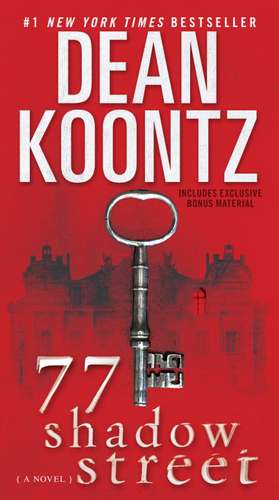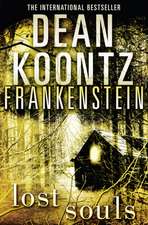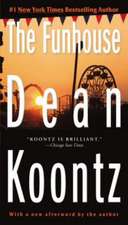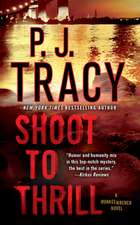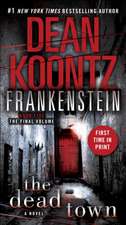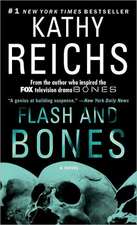77 Shadow Street
Autor Dean R. Koontzen Limba Engleză Paperback – 27 aug 2012
Welcome to the Pendleton. Built as a tycoon’s dream home in the 1880s and converted to luxury condominiums not quite a century later, the Gilded Age palace at the summit of Shadow Hill is a sanctuary for its fortunate residents. Scant traces remain of the episodes of madness, suicide, mass murder—and whispers of things far worse—that have scarred its grandeur almost from the beginning.
But now inexplicable shadows caper across walls, security cameras relay impossible images, phantom voices mutter in strange tongues, not-quite-human figures lurk in the basement, elevators plunge into unknown depths. With each passing hour a terrifying certainty grows: Whatever drove the Pendleton’s past occupants to their unspeakable fates is at work again. And as nightmare visions become real, as a deadly tide begins to engulf them, the people at 77 Shadow Street will find the key to humanity’s future . . . if they can survive to use it.
Includes the bonus novella The Moonlit Mind—first time in print
| Toate formatele și edițiile | Preț | Express |
|---|---|---|
| Paperback (2) | 65.12 lei 3-5 săpt. | |
| Bantam – 27 aug 2012 | 65.12 lei 3-5 săpt. | |
| HarperCollins Publishers – 7 iun 2012 | 71.02 lei 3-5 săpt. | +14.26 lei 10-14 zile |
Preț: 65.12 lei
Nou
Puncte Express: 98
Preț estimativ în valută:
12.46€ • 13.04$ • 10.31£
12.46€ • 13.04$ • 10.31£
Carte disponibilă
Livrare economică 15-29 martie
Preluare comenzi: 021 569.72.76
Specificații
ISBN-13: 9780553593068
ISBN-10: 0553593064
Pagini: 698
Dimensiuni: 110 x 191 x 43 mm
Greutate: 0.39 kg
Editura: Bantam
ISBN-10: 0553593064
Pagini: 698
Dimensiuni: 110 x 191 x 43 mm
Greutate: 0.39 kg
Editura: Bantam
Recenzii
PRAISE FOR DEAN KOONTZ
“One of the master storytellers of this or any age.”—The Tampa Tribune
“Koontz writes first-rate suspense, scary and stylish.”—Los Angeles Times
“A rarity among bestselling writers, Koontz continues to pursue new ways of telling stories, never content with repeating himself. He writes of hope and love in the midst of evil in profoundly inspiring and moving ways.”—Chicago Sun-Times
“A master at spinning dark tales . . . Koontz knows how to dial up the terror.”—Associated Press
“Koontz is a superb plotter and wordsmith. He chronicles the hopes and fears of our time in broad strokes and fine detail, using popular fiction to explore the human condition [and] demonstrating that the real horror of life is found not in monsters, but within the human psyche.”—USA Today
“Koontz . . . is a master storyteller and a daring writer. . . . He gives readers bright hope in a dark world.”—Publishers Weekly (starred review)
“Dean Koontz . . . has the power to scare the daylights out of us.”—People
“Dean Koontz is not just a master of our darkest dreams, but also a literary juggler.”—The Times (London)
“One of the master storytellers of this or any age.”—The Tampa Tribune
“Koontz writes first-rate suspense, scary and stylish.”—Los Angeles Times
“A rarity among bestselling writers, Koontz continues to pursue new ways of telling stories, never content with repeating himself. He writes of hope and love in the midst of evil in profoundly inspiring and moving ways.”—Chicago Sun-Times
“A master at spinning dark tales . . . Koontz knows how to dial up the terror.”—Associated Press
“Koontz is a superb plotter and wordsmith. He chronicles the hopes and fears of our time in broad strokes and fine detail, using popular fiction to explore the human condition [and] demonstrating that the real horror of life is found not in monsters, but within the human psyche.”—USA Today
“Koontz . . . is a master storyteller and a daring writer. . . . He gives readers bright hope in a dark world.”—Publishers Weekly (starred review)
“Dean Koontz . . . has the power to scare the daylights out of us.”—People
“Dean Koontz is not just a master of our darkest dreams, but also a literary juggler.”—The Times (London)
Notă biografică
Dean Koontz, the author of many #1 New York Times bestsellers, lives in Southern California with his wife, Gerda, their golden retriever, Anna, and the enduring spirit of their golden, Trixie.
Extras
1
The North Elevator
Bitter and drunk, Earl Blandon, a former United States senator, got home at 2:15 a.m. that Thursday with a new tattoo: a two-word obscenity in blue block letters between the knuckles of the middle finger of his right hand. Earlier in the night, at a cocktail lounge, he’d thrust that stiff digit at another customer who didn’t speak English and who was visiting from some third-world backwater where the meaning of the offending gesture evidently wasn’t known in spite of countless Hollywood films in which numerous cinema idols had flashed it. In fact, the ignorant foreigner seemed to mistake the raised finger for some kind of friendly hello and reacted by nodding repeatedly and smiling. Earl was frustrated directly out of the cocktail lounge and into a nearby tattoo parlor, where he resisted the advice of the needle artist and, at the age of fifty-eight, acquired his first body decoration.
When Earl strode through the front entrance of the exclusive Pendleton, into the lobby, the night concierge, Norman Fixxer, greeted him by name. Norman sat on a stool behind the reception counter to the left, a book open in front of him, looking like a ventriloquist’s dummy: eyes wide and blue and glassy, pronounced marionette lines like scars in his face, head cocked at an odd angle. In a tailored black suit and a crisp white shirt and a black bow tie, with a fussily arranged white pocket handkerchief blossoming from the breast pocket of his coat, Norman was overdressed by the standards of the two other concierges who worked the earlier shifts.
Earl Blandon didn’t like Norman. He didn’t trust him. The concierge tried too hard. He was excessively polite. Earl didn’t trust polite people who tried too hard. They always proved to be hiding something. Sometimes they hid the fact that they were FBI agents, pretending instead to be lobbyists with a suitcase full of cash and a deep respect for the power of a senator. Earl didn’t suspect that Norman Fixxer was an FBI agent in disguise, but the concierge was for damn sure something more than what he pretended to be.
Earl acknowledged Norman’s greeting with only a scowl. He wanted to raise his newly lettered middle finger, but he restrained himself. Offending a concierge was a bad idea. Your mail might go missing. The suit you expected back from the dry cleaner by Wednesday evening might be delivered to your apartment a week later. With food stains. Although flashing the finger at Norman would be satisfying, a full apology would require doubling the usual Christmas gratuity.
Consequently, Earl scowled across the marble-floored lobby, his embellished finger curled tightly into his fist. He went through the inner door that Norman buzzed open for him and into the communal hallway, where he turned left and, licking his lips at the prospect of a nightcap, proceeded to the north elevator.
His third-floor apartment was at the top of the building. He did not have a city view, only windows on the courtyard, and seven other apartments shared that level, but his unit was sufficiently well-positioned to justify calling it his penthouse, especially because it was in the prestigious Pendleton. Earl once owned a five-acre estate with a seventeen-room manor house. He liquidated it and other assets to pay the ruinous fees of the blood-sucking, snake-hearted, lying-bastard, may-they-all-rot-in-hell defense attorneys.
As the elevator doors slid shut and as the car began to rise, Earl surveyed the hand-painted mural that covered the walls above the white wainscoting and extended across the ceiling: bluebirds soaring joyously through a sky in which the clouds were golden with sunlight. Sometimes, like now, the beauty of the scene and the joy of the birds seemed forced, aggravatingly insistent, so that Earl wanted to get a can of spray paint and obliterate the entire panorama.
He might have vandalized it if there hadn’t been security cameras in the hallways and in the elevator. But the homeowners’ association would only restore it and make him pay for the work. Large sums of money no longer came to him in suitcases, in valises, in fat manila envelopes, in grocery bags, in doughnut-shop boxes, or taped to the bodies of high-priced call girls who arrived naked under leather trench coats. These days, this former senator so frequently felt the urge to deface so many things that he needed to strive to control himself lest he vandalize his way into the poorhouse.
He closed his eyes to shut out the schmaltzy scene of sun-washed bluebirds. When the air temperature abruptly dropped perhaps twenty degrees in an instant, as the car passed the second floor, Earl’s eyes startled open, and he turned in bewilderment when he saw that the mural no longer surrounded him. The security camera was missing. The white wainscoting had vanished, too. No inlaid marble underfoot. In the stainless-steel ceiling, circles of opaque material shed blue light. The walls, doors, and floor were all brushed stainless steel.
Before Earl Blandon’s martini-marinated brain could fully absorb and accept the elevator’s transformation, the car stopped ascending—and plummeted. His stomach seemed to rise, then to sink. He stumbled sideways, clutched the handrail, and managed to remain on his feet.
The car didn’t shudder or sway. No thrumming of hoist cables. No clatter of counterweights. No friction hum of rollers whisking along greased guide rails. With express-elevator speed, the steel box raced smoothly, quietly down.
Previously, the car-station panel—B, 1, 2, 3—had been part of the controls to the right of the doors. It still was there, but now the numbers began at 3, descended to 2 and 1 and B, followed by a new 1 through 30. He would have been confused even if he’d been sober. As the indicator light climbed—7, 8, 9—the car dropped. He couldn’t be mistaking upward momentum for descent. The floor seemed to be falling out from under him. Besides, the Pendleton had just four levels, only three aboveground. The floors represented on this panel must be subterranean, all below the basement.
But that made no sense. The Pendleton had one basement, a single underground level, not thirty or thirty-one.
So this could not be the Pendleton anymore. Which made even less sense. No sense at all.
Maybe he had passed out. A vodka nightmare.
No dream could be this vivid, this intensely physical. His heart thundered. His pulse throbbed in his temples. Acid reflux burned his throat, and when he swallowed hard to force down the bitter flood, the effort brought tears that blurred his vision.
He blotted the tears with a suit-coat sleeve. He blinked at the indicator board: 13, 14, 15. . . .
Panicked by a sudden intuitive conviction that he was being conveyed to a place as terrifying as it was mysterious, Earl let go of the handrail. He crossed the car and scanned the backlit control board for an emergency stop button.
None existed.
As the car passed 23, Earl jammed a thumb hard against the button for 26, but the elevator didn’t stop, didn’t even slow until it passed 29. Then rapidly yet smoothly, momentum fell. With a faint liquid hiss like hydraulic fluid being compressed in a cylinder, the car came to a full stop, apparently thirty floors under the city.
Sobered by a supernatural fear—fear of what, he could not say—Earl Blandon shrank away from the doors. With a thud, he backed into the rear wall of the car.
In his storied past, as a member of the Senate Armed Services Committee, he had once been to a meeting in the bunker far beneath the White House, where the president might one day try to ride out a nuclear holocaust. That deep redoubt was bright and clean, yet it impressed him as more ominous than any graveyard at night. He had some experience of cemeteries from his earliest days as a state lawmaker, when he had thought that in such lonely places, from earth and graves and dust, no one could be raised up to witness the paying of a bribe. This quiet elevator felt far more ominous than even the presidential bunker.
He waited for the doors to open. And waited.
Throughout his life, he’d never been a fearful man. Instead, he inspired fear in others. He was surprised that he could be so suddenly and completely terrorized. But he understood what reduced him to this pathetic condition: evidence of something otherworldly.
A strict materialist, Earl believed only in what he could see, touch, taste, smell, and hear. He trusted nothing but himself, and he needed no one. He believed in the power of his mind, in his singular cunning, to bend any situation to his benefit.
In the presence of the uncanny, he was without defense.
Shudders passed through him with such violence that it seemed he should hear his bones knocking together. He tried to make fists, but proved to be so weak with dread that he could not clench his hands. He raised them from his sides, looked at them, willing them to close into tight knuckled weapons.
He was sober enough now to realize that the two words tattooed on the middle finger of his right hand could have made his insult no clearer to the clueless third-world patron in the cocktail lounge. The guy probably couldn’t read English any more than he could speak it.
As close to a negative self-judgment as he had ever come, Earl Blandon muttered, “Idiot.”
As the car doors slid open, his enlarged prostate seemed to clench as his fists would not. He came perilously close to peeing in his pants.
Beyond the open doors lay only a darkness so perfect that it seemed to be an abyss, vast and perhaps bottomless, into which the blue light of the elevator could not penetrate. In this icy silence of the tomb, Earl Blandon stood motionless, deaf now even to the pounding in his chest, as if his heart were suddenly dry of blood. This was the quiet at the limit of the world, where no air existed to be breathed, where time ended. It was the most terrible thing he had ever heard—until a more alarming sound, that of something approaching, arose from the blackness beyond the open doors.
Ticking, scraping, muffled rustling: This was either the blind but persistent questing of something large and strange beyond the power of the senator’s imagination . . . or a horde of smaller but no less mysterious creatures, an eager swarm. A shrill keening, almost electronic in nature yet unmistakably a voice, quivered through the blackness, a cry that might have been of hunger or desire, or bloodletting frenzy, but certainly a cry of urgent need.
As panic trumped Earl’s paralyzing dread, he bolted to the control panel, scanning it for a close door button. Every elevator offered such a feature. Except this one. There was neither a close door nor an open door button, neither one labeled emergency stop nor one marked alarm, neither a telephone nor a service intercom, only the numbers, as if this were an elevator that never malfunctioned or required service.
In his peripheral vision, he saw something loom in the open doorway. When he turned to face it directly, he thought the sight would stop his heart, but such an easy end was not his fate.
The North Elevator
Bitter and drunk, Earl Blandon, a former United States senator, got home at 2:15 a.m. that Thursday with a new tattoo: a two-word obscenity in blue block letters between the knuckles of the middle finger of his right hand. Earlier in the night, at a cocktail lounge, he’d thrust that stiff digit at another customer who didn’t speak English and who was visiting from some third-world backwater where the meaning of the offending gesture evidently wasn’t known in spite of countless Hollywood films in which numerous cinema idols had flashed it. In fact, the ignorant foreigner seemed to mistake the raised finger for some kind of friendly hello and reacted by nodding repeatedly and smiling. Earl was frustrated directly out of the cocktail lounge and into a nearby tattoo parlor, where he resisted the advice of the needle artist and, at the age of fifty-eight, acquired his first body decoration.
When Earl strode through the front entrance of the exclusive Pendleton, into the lobby, the night concierge, Norman Fixxer, greeted him by name. Norman sat on a stool behind the reception counter to the left, a book open in front of him, looking like a ventriloquist’s dummy: eyes wide and blue and glassy, pronounced marionette lines like scars in his face, head cocked at an odd angle. In a tailored black suit and a crisp white shirt and a black bow tie, with a fussily arranged white pocket handkerchief blossoming from the breast pocket of his coat, Norman was overdressed by the standards of the two other concierges who worked the earlier shifts.
Earl Blandon didn’t like Norman. He didn’t trust him. The concierge tried too hard. He was excessively polite. Earl didn’t trust polite people who tried too hard. They always proved to be hiding something. Sometimes they hid the fact that they were FBI agents, pretending instead to be lobbyists with a suitcase full of cash and a deep respect for the power of a senator. Earl didn’t suspect that Norman Fixxer was an FBI agent in disguise, but the concierge was for damn sure something more than what he pretended to be.
Earl acknowledged Norman’s greeting with only a scowl. He wanted to raise his newly lettered middle finger, but he restrained himself. Offending a concierge was a bad idea. Your mail might go missing. The suit you expected back from the dry cleaner by Wednesday evening might be delivered to your apartment a week later. With food stains. Although flashing the finger at Norman would be satisfying, a full apology would require doubling the usual Christmas gratuity.
Consequently, Earl scowled across the marble-floored lobby, his embellished finger curled tightly into his fist. He went through the inner door that Norman buzzed open for him and into the communal hallway, where he turned left and, licking his lips at the prospect of a nightcap, proceeded to the north elevator.
His third-floor apartment was at the top of the building. He did not have a city view, only windows on the courtyard, and seven other apartments shared that level, but his unit was sufficiently well-positioned to justify calling it his penthouse, especially because it was in the prestigious Pendleton. Earl once owned a five-acre estate with a seventeen-room manor house. He liquidated it and other assets to pay the ruinous fees of the blood-sucking, snake-hearted, lying-bastard, may-they-all-rot-in-hell defense attorneys.
As the elevator doors slid shut and as the car began to rise, Earl surveyed the hand-painted mural that covered the walls above the white wainscoting and extended across the ceiling: bluebirds soaring joyously through a sky in which the clouds were golden with sunlight. Sometimes, like now, the beauty of the scene and the joy of the birds seemed forced, aggravatingly insistent, so that Earl wanted to get a can of spray paint and obliterate the entire panorama.
He might have vandalized it if there hadn’t been security cameras in the hallways and in the elevator. But the homeowners’ association would only restore it and make him pay for the work. Large sums of money no longer came to him in suitcases, in valises, in fat manila envelopes, in grocery bags, in doughnut-shop boxes, or taped to the bodies of high-priced call girls who arrived naked under leather trench coats. These days, this former senator so frequently felt the urge to deface so many things that he needed to strive to control himself lest he vandalize his way into the poorhouse.
He closed his eyes to shut out the schmaltzy scene of sun-washed bluebirds. When the air temperature abruptly dropped perhaps twenty degrees in an instant, as the car passed the second floor, Earl’s eyes startled open, and he turned in bewilderment when he saw that the mural no longer surrounded him. The security camera was missing. The white wainscoting had vanished, too. No inlaid marble underfoot. In the stainless-steel ceiling, circles of opaque material shed blue light. The walls, doors, and floor were all brushed stainless steel.
Before Earl Blandon’s martini-marinated brain could fully absorb and accept the elevator’s transformation, the car stopped ascending—and plummeted. His stomach seemed to rise, then to sink. He stumbled sideways, clutched the handrail, and managed to remain on his feet.
The car didn’t shudder or sway. No thrumming of hoist cables. No clatter of counterweights. No friction hum of rollers whisking along greased guide rails. With express-elevator speed, the steel box raced smoothly, quietly down.
Previously, the car-station panel—B, 1, 2, 3—had been part of the controls to the right of the doors. It still was there, but now the numbers began at 3, descended to 2 and 1 and B, followed by a new 1 through 30. He would have been confused even if he’d been sober. As the indicator light climbed—7, 8, 9—the car dropped. He couldn’t be mistaking upward momentum for descent. The floor seemed to be falling out from under him. Besides, the Pendleton had just four levels, only three aboveground. The floors represented on this panel must be subterranean, all below the basement.
But that made no sense. The Pendleton had one basement, a single underground level, not thirty or thirty-one.
So this could not be the Pendleton anymore. Which made even less sense. No sense at all.
Maybe he had passed out. A vodka nightmare.
No dream could be this vivid, this intensely physical. His heart thundered. His pulse throbbed in his temples. Acid reflux burned his throat, and when he swallowed hard to force down the bitter flood, the effort brought tears that blurred his vision.
He blotted the tears with a suit-coat sleeve. He blinked at the indicator board: 13, 14, 15. . . .
Panicked by a sudden intuitive conviction that he was being conveyed to a place as terrifying as it was mysterious, Earl let go of the handrail. He crossed the car and scanned the backlit control board for an emergency stop button.
None existed.
As the car passed 23, Earl jammed a thumb hard against the button for 26, but the elevator didn’t stop, didn’t even slow until it passed 29. Then rapidly yet smoothly, momentum fell. With a faint liquid hiss like hydraulic fluid being compressed in a cylinder, the car came to a full stop, apparently thirty floors under the city.
Sobered by a supernatural fear—fear of what, he could not say—Earl Blandon shrank away from the doors. With a thud, he backed into the rear wall of the car.
In his storied past, as a member of the Senate Armed Services Committee, he had once been to a meeting in the bunker far beneath the White House, where the president might one day try to ride out a nuclear holocaust. That deep redoubt was bright and clean, yet it impressed him as more ominous than any graveyard at night. He had some experience of cemeteries from his earliest days as a state lawmaker, when he had thought that in such lonely places, from earth and graves and dust, no one could be raised up to witness the paying of a bribe. This quiet elevator felt far more ominous than even the presidential bunker.
He waited for the doors to open. And waited.
Throughout his life, he’d never been a fearful man. Instead, he inspired fear in others. He was surprised that he could be so suddenly and completely terrorized. But he understood what reduced him to this pathetic condition: evidence of something otherworldly.
A strict materialist, Earl believed only in what he could see, touch, taste, smell, and hear. He trusted nothing but himself, and he needed no one. He believed in the power of his mind, in his singular cunning, to bend any situation to his benefit.
In the presence of the uncanny, he was without defense.
Shudders passed through him with such violence that it seemed he should hear his bones knocking together. He tried to make fists, but proved to be so weak with dread that he could not clench his hands. He raised them from his sides, looked at them, willing them to close into tight knuckled weapons.
He was sober enough now to realize that the two words tattooed on the middle finger of his right hand could have made his insult no clearer to the clueless third-world patron in the cocktail lounge. The guy probably couldn’t read English any more than he could speak it.
As close to a negative self-judgment as he had ever come, Earl Blandon muttered, “Idiot.”
As the car doors slid open, his enlarged prostate seemed to clench as his fists would not. He came perilously close to peeing in his pants.
Beyond the open doors lay only a darkness so perfect that it seemed to be an abyss, vast and perhaps bottomless, into which the blue light of the elevator could not penetrate. In this icy silence of the tomb, Earl Blandon stood motionless, deaf now even to the pounding in his chest, as if his heart were suddenly dry of blood. This was the quiet at the limit of the world, where no air existed to be breathed, where time ended. It was the most terrible thing he had ever heard—until a more alarming sound, that of something approaching, arose from the blackness beyond the open doors.
Ticking, scraping, muffled rustling: This was either the blind but persistent questing of something large and strange beyond the power of the senator’s imagination . . . or a horde of smaller but no less mysterious creatures, an eager swarm. A shrill keening, almost electronic in nature yet unmistakably a voice, quivered through the blackness, a cry that might have been of hunger or desire, or bloodletting frenzy, but certainly a cry of urgent need.
As panic trumped Earl’s paralyzing dread, he bolted to the control panel, scanning it for a close door button. Every elevator offered such a feature. Except this one. There was neither a close door nor an open door button, neither one labeled emergency stop nor one marked alarm, neither a telephone nor a service intercom, only the numbers, as if this were an elevator that never malfunctioned or required service.
In his peripheral vision, he saw something loom in the open doorway. When he turned to face it directly, he thought the sight would stop his heart, but such an easy end was not his fate.
Descriere
Descriere de la o altă ediție sau format:
The latest horror novel from the bestselling author of "Brother Odd" and "What The Night Knows". Shadow Hill is a palace built in the late 19th century, and has been scarred by bouts of madness, suicide and mass murder. Koontz has sold more than 400 million books worldwide, and he currently writes 2 books a year. 'Dean Koontz is not just a master of our darkest dreams, but also a literary juggler' "The Times"
The latest horror novel from the bestselling author of "Brother Odd" and "What The Night Knows". Shadow Hill is a palace built in the late 19th century, and has been scarred by bouts of madness, suicide and mass murder. Koontz has sold more than 400 million books worldwide, and he currently writes 2 books a year. 'Dean Koontz is not just a master of our darkest dreams, but also a literary juggler' "The Times"
